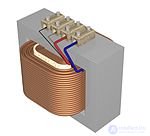Lecture

The physical essence of the magnetostriction process during magnetization reversal
Magnetostriction (from the Latin. Strictio - compression, tension) is the phenomenon that, when the state of the body magnetization changes, its volume and linear dimensions change.
The effect was discovered by Joule in 1842 and is caused by a change in the interconnections between atoms in a crystal lattice, and is therefore characteristic of all substances. A change in body shape can manifest itself, for example, in tension, compression, change in volume, which depends both on the acting magnetic field and on the crystal structure of the body. The largest size changes usually occur in highly magnetic materials. Their relative elongation  usually varies within
usually varies within 
The magnetostrictive effect is reversible; when the body changes its linear dimensions under the action of external forces, its magnetic properties change accordingly. This phenomenon is called the magnetoelastic effect (the Villari effect).

Low frequency transformer.
When working with many appliances, you can hear the noise emanating from them (hum, "singing", etc.). The noise of devices powered by a household electrical outlet may be similar to a buzz or buzz (listen to a buzz (inf.)). One of the possible reasons [1] for this is the magnetostriction of cores in inductive structures, such as transformers or chokes. When alternating current flows through their coils, an alternating magnetic field of the same frequency is created, which causes the ferromagnetic cores to compress and stretch (with a frequency of 100 Hz for 50 Hz current or multiple frequencies), which in turn transmit these vibrations to the air and other elements designs. Loud noise can degrade the comfort of the surrounding space. The effect of vibration on the internal elements of the structure can cause progressive cracking that can damage the device.
This example illustrates the phenomenon well, but in fact it is not: the plates from which the core is made are buzzing, pushing away - it is worth pouring glue on it or (as was done before) to drive a wooden chip and the hum will stop. Solid cores "buzz" so weakly that you need a special device to capture the noise from them.
Currently used such magnetostriction materials such as alfer, nickel, permendur.
To measure the liquid level in the tank, a vertical waveguide made of a magnetostrictive material is installed. This is done in such a way that the tip of the waveguide is placed on the outer upper surface of the tank, and the lower end rests on the bottom. An annular float is mounted on the waveguide, containing permanent magnets and freely floating on the surface of the liquid. An ultrasonic pulse is fed from the tip into the waveguide. Due to the magnetostriction effect — in this case, the opposite of the Villari effect — the float mechanically deforms the waveguide. Reflected from this deformation, the ultrasonic impulse returns to the tip, where the time of its arrival is measured. At this time, judged on the height of the float on the waveguide, and hence on the level of liquid in the tank [2].
When using floats with different specific mass, it is possible to measure not only the liquid level (the level of the interface between the liquid and gaseous phases), but also the level of the separation of media with different densities (for example, gasoline and commercial water).
In practice, this method is used to measure the level in tanks up to 18 m high and provides a fairly small absolute measurement error - about 1 mm.
Magnetostriction is used to generate ultrasound and hypersound. For a hypersound with a frequency of the order of 1 GHz, magnetostriction remains practically the only realistic method for obtaining it.
Some anti-ink systems use tags whose principle of operation is based on the use of materials with a large magnetostrictive effect.
In the first computers, wires were used that twisted or unwound under the action of a magnetic field, thus realizing the memory on the delay lines.
Comments
To leave a comment
Basic Physics
Terms: Basic Physics